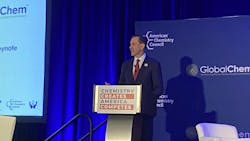Chemical Processing Notebook: ACC CEO Pushes TSCA Reforms at GlobalChem
WASHINGTON, D.C. — American Chemistry Council CEO Chris Jahn can already begin checking off items from the wish list he presented at the 38th annual GlobalChem conference in Washington, D.C., just weeks ago. The May 5 announcement that the U.S. Environmental Protection Agency will transfer scientists from the Office of Research and Development to the new chemicals division represents a significant first step toward one of his primary goals: reforming the new chemicals review process.
“The system is broken,” said Jahn during his opening remarks on April 15. “We’re not asking for the law to be overhauled, but we are calling for it to be fixed. We need a new chemicals program that works, that’s predictable and that encourages innovation — not one that delays progress.”
Buzzer Beater for Chemical Reviews
Among the changes that Jahn would like to see under Trump’s leadership is a “shot clock” for new chemicals reviews. According to Jahn, EPA misses its review deadline 90% of the time.
“That shot clock must come with an enforcement mechanism with teeth,” said Jahn. “Without accountability, timelines are just suggestions.”
I followed up with Telly Lovelace, ACC’s director of issue communications, to find out what, specifically, Jahn meant by a “shot clock.” Here’s what Lovelace said:
“The 90-day shot clock for new chemicals reviews Chris referenced would be an internal policy change the administrator could implement, counting down the number of days it takes the agency to complete TSCA (Toxic Substances Control Act) new chemical reviews. The new chemicals shot clock should include an enforcement mechanism to hold EPA accountable when the agency misses the 90-day deadline to review new chemicals substances coming to the market. The 2016 Lautenberg Amendments, modernizing TSCA, already require EPA to review new chemicals within 90 days. This just goes one step further in holding EPA accountable and increases transparency.”
When asked what Jahn meant by an “enforcement mechanism,” Lovelace said: “Determining the ‘enforcement mechanism’ parameters would be at the discretion of the EPA administrator."
Jahn also called on the administration to streamline energy permitting, recognize pyrolysis as recycling rather than solid waste disposal, reform the nation’s freight rail system and implement an "all of the above" approach to U.S. energy development.
ACC Survey Under Scrutiny
Jahn concluded his speech with a review of ACC’s Morning Consult poll. He cited some figures that suggest the public is on the side of industry when it comes to regulatory reform. For example, he stated:
“Two-thirds of Americans agree that reducing onerous regulations and modernizing permitting policies will boost American chemical manufacturing. Americans want to promote economic growth and incentivize the development of new chemicals domestically instead of offshoring it to foreign adversaries. Nearly three-quarters of Americans agree that practical policy and regulation can be developed that both protects the environment and human health without sacrificing manufacturing jobs and U.S. competitiveness.”
He added that a “super majority” of Americans support updating TSCA and agree that Congress should use its statutory authority to revise the law.
Morning Consult surveyed 2,196 U.S. adults in March with additional samples from Texas, Louisiana, Ohio, West Virginia, Pennsylvania, Minnesota and Michigan. After we published an article on the survey results, Joel Tickner, a professor of environmental health at the UMass Lowell, challenged the survey, calling it "ridiculous at best." He argued most Americans lack understanding of chemical regulations, noting "even staff at chemical companies don't know the regulatory framework."
Tickner's main critique concerned the survey's framing: "The questions asked are way too sophisticated for any general person to have a good answer... Most Americans think that chemicals are regulated like drugs — that EPA 'approves them,' which is not the case under TSCA."
He added that “it was an inappropriate and ineffective tool yet one that gave the ACC the answers it wanted, even if they aren’t really valid answers. A better use of this type of survey would be more general questions like opinions on the chemical industry, or “do they think that government is doing enough to protect the public from chemical exposures? Questions regarding EPA’s 90-day deadline would not be answerable by most people.”
ACC forwarded a Morning Consult statement defending their approach, stating the survey "was intentionally designed with funneling questions at the start to ease respondents into the topic. These early questions focus on general perceptions of the industry and regulations, rather than diving immediately into complex topics like TSCA or the EPA."
Morning Consult further backed their methodology, noting that "respondents are informed upfront that they will be asked questions about [TSCA's] implementation before being presented with any evaluative statements. This approach ensures they are not primed to respond in any particular direction."
The survey group acknowledged the challenge of polling on complex topics but maintained that public opinion still matters: "While general consumers are less likely to be deeply informed on policy than subject-matter experts, that does not preclude them from participating in conversations around public policy." Morning Consult positioned the results as "a starting point for understanding public sentiment on TSCA, the EPA, and the broader industry — and as an indicator of where further education and outreach may be needed."
ACC also issued a statement in support of the survey methodology:
“The professor's criticisms appear to be based on assumptions rather than facts, and they reflect a fundamental misunderstanding of the survey's methodology and purpose. It's important to note that the professor has not reviewed the actual survey questions or the context in which they were presented. Without that information, the professor’s criticism lacks credibility and is based on speculation rather than informed analysis.”
Navigating Regulatory Complexity
With so much regulatory uncertainty, chemical manufacturers will need to be alert, cautioned Sara Beth Watson, an attorney with Wiley Rein LLP who spoke with me at GlobalChem.
For example, pay attention to the prioritization process under TSCA and start gathering information as soon as the agency places your chemical on the list, said Watson, who has expertise on environmental, chemical regulatory and occupational safety issues.
Don’t wait until a chemical reaches the risk-management phase to gather data about the substance in question, she added.
“Those lists are published and should be checked periodically,” Watson said. “You should have some method for checking them, either yourself or through a trade association.”
“You don’t want to be at the end of the process. You want to be involved at the beginning,” she advised.
With regulatory timelines becoming increasingly unpredictable, she recommends tapping into trade associations for updates when new proposals emerge. Also watch for industry coalitions that form around specific chemicals under scrutiny. These collaborative groups offer manufacturers a unified voice and shared resources to navigate the complex regulatory landscape, Watson said.
“You may not be the one going to EPA, but you can work within those groups.”
About the Author
Jonathan Katz
Executive Editor
Jonathan Katz, executive editor, brings nearly two decades of experience as a B2B journalist to Chemical Processing magazine. He has expertise on a wide range of industrial topics. Jon previously served as the managing editor for IndustryWeek magazine and, most recently, as a freelance writer specializing in content marketing for the manufacturing sector.
His knowledge areas include industrial safety, environmental compliance/sustainability, lean manufacturing/continuous improvement, Industry 4.0/automation and many other topics of interest to the Chemical Processing audience.
When he’s not working, Jon enjoys fishing, hiking and music, including a small but growing vinyl collection.
Jon resides in the Cleveland, Ohio, area.

